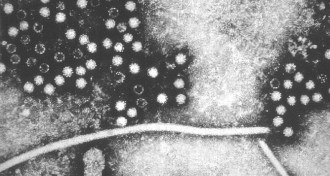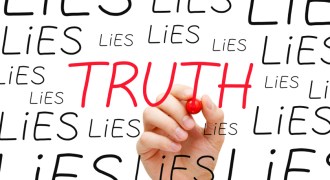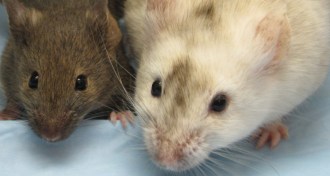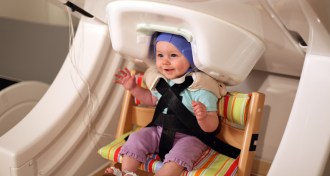Humans
Sign up for our newsletter
We summarize the week's scientific breakthroughs every Thursday.
-
 Neuroscience
NeurosciencePart of brain’s pleasure network curbed in mice with chronic pain
Part of brain’s pleasure network is muffled in mice with chronic paw injuries, a new study finds.
-
 Health & Medicine
Health & MedicineFist bumps spread fewer bacteria than handshakes
Fist bumping spreads far fewer bacteria than a handshake or a high five, a new study shows.
-
 Health & Medicine
Health & MedicineResistance to key malaria drug spreads
Parasites that are less susceptible to artemisinin now affect several Asian countries.
By Nathan Seppa -
 Psychology
PsychologyGoalkeepers deceive themselves when facing penalty kicks
Soccer’s goalies fall victim to a logical fallacy during the sport’s most high-pressure situation, seeing trends where none exists.
By Nsikan Akpan -
 Health & Medicine
Health & MedicineHepatitis E widespread among English blood donors
Screening of 225,000 blood donations reveals a high prevalence of the hepatitis E virus.
-
 Tech
TechSmall lies in social networks may keep society running
Lying in social networks could have adverse, as well as beneficial, effects depending on the severity of the deception.
-
 Health & Medicine
Health & MedicineBoot camp bug
Adenoviruses, which cause respiratory illnesses including some colds, plague boot camps.
By Nsikan Akpan -
 Genetics
GeneticsGene activity change can produce cancer
Scientists have long thought that epigenetic changes, which alter gene activity, can cause cancer. Now they have demonstrated it in a mouse experiment.
-
 Health & Medicine
Health & MedicineLong-term Parkinson’s treatment sheds bad rep
Prolonged used of levodopa doesn’t increase the severity of side effects from the Parkinson’s drug, new research shows.
-
 Health & Medicine
Health & MedicineTests hint at trouble with pairing cystic fibrosis drugs
Combining two types of cystic fibrosis drugs may cancel out the benefits of one of the medications.
-
 Psychology
PsychologySchadenfreude starts young
Children as young as 2 years old feel joy at another’s misfortune, new research suggests, showing jealousy’s deep roots.
-
 Health & Medicine
Health & MedicineBabies’ brains practice words long before they can speak
When listening to speech, babies’ brains are active in motor areas required for moving the mouth and tongue in ways that produce words.